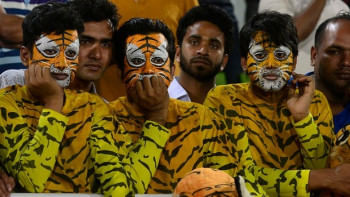The Tigers' missed opportunity to unite a nation

The group stage of the 2023 ICC Men's Cricket World Cup is fast approaching its end, and it's been a rollercoaster ride for one of the 10 participating teams, Bangladesh. As they entered the tournament, they held fast to the competition's slogan: "It takes one day to make history and be history." After a strong initial victory against the underdog Afghanistan, optimism soared. Fans began to believe that a single day's performance could catapult them ahead of their competitors. However, the elation of their early win soon gave way to the agony of consecutive defeats. Even the most ardent supporters withdrew their backing, disheartened by their team's dismal performance. It wasn't just the losses that disappointed, but the manner in which the team succumbed to their opponents, resembling a group of schoolchildren grappling with internal conflicts. The governing board, despite its authority, failed to exorcise the demons plaguing the team, resulting in a loss of respect both on and off the field.
The buildup of enthusiasm before the tournament and the ensuing disappointment following their underwhelming performance underscore a broader issue within our national psyche. Since Bangladesh joined the elite ranks of test-playing nations in 2000, cricket has supplanted football as the most cherished sport. It has become a unifying force for a nation brimming with sports enthusiasts. Over the past two decades, the nation has embraced this once imperial game, making it a passport to gain global recognition. The 11 players on the field represent more than just athletes; they symbolise the iconic Royal Bengal Tiger, serving as torchbearers for a collective identity that resonates with millions.
Internal politics and power struggles have disrupted the team's harmony and cohesion. These issues extend beyond the cricket field, serving as symptoms of a larger societal problem, one that hints at a lack of unity and a shared purpose. The absence of democratic norms, with long-standing leaders at the helm and no significant improvements to the team, belies the nation's potential talent and resilience.
A rickshaw-puller gazes at a TV showroom, watching the men in green dash between the wickets; a garment worker listens to commentary on her phone while returning from work; a bank teller discreetly monitors scores on his computer screen; family members gather in their living rooms to offer unsolicited expertise after each shot; and avid fans travel abroad donning team jerseys to witness their team's efforts. The national anthem at the start of every game brings tears to millions' eyes, uniting the entire nation under a banner of pride.
Historian Eric Hobsbawm aptly notes, "The imagined community of millions seems more real as a team of 11 named people." Expanding upon historian Benedict Anderson's concept of "imagined communities," Hobsbawm emphasises how sports provide a platform for a community to imagine their togetherness. Sociologists have observed the inseparable link between a national sports team and the manifestation of national identity. The national cricket team's journey through international competitions often mirrors the country's own path, filled with ups and downs, resilience, and hope. When a national team participates in an international sporting event, it acts as a gateway to understanding one another's cultures, offering a glimpse into the national psyche.
Within this larger sports drama, numerous subplots have unfolded, pitting the national against the international. The defeat of the Springboks by the Dutch, steeped in colonial memory, is a prime example. A similar mini-drama played out when the Afghans defeated Pakistan, the team that once mentored them onto the world stage. The quintessentially English game has fallen behind on the world stage, showing that even the inventor of the sport is not immune to stumbles. The "blue wave" created by the Indian team is not a coincidence. The rise of cricket in India mirrors the rise of a new India, as Harsha Bhogle articulated in a 2010 TED talk. India's strategic investment in the Indian Premier League (IPL), the celebration of regional teams, the auctioning of foreign players like commodities, and the infusion of Bollywood glamour into the once genteel game known for character-building has made India nearly unbeatable on their home turf.
Comparatively, Bangladesh's performances have not only been subpar but also marred by controversies. The management mishandled the captaincy issue, allowing a star player to hold the team hostage. Fans grew disillusioned as the team lost its regular opener and captain due to petty politics. The talismanic stand-in captain often prioritised personal interests over national duties. His ego, rather than cricketing sense, led to changes in the batting order and risky experiments with untested rookies. The highly paid coaching staff viewed this prestigious event as nothing more than a learning opportunity. The head coach's comments indicated a lack of belief in the team's capacity to win the trophy, prompting those who harboured such dreams to wake up.
Midway through the tournament, the captain left the team abroad, ostensibly seeking batting tips from a personal coach. The board, boasting a balance sheet with Tk 900 crore, remained passive and allowed the ego-driven leader to manipulate the situation. Senior players felt neglected, and junior players lacked the experience and expertise for the highest level of play. These issues are not isolated anomalies but rather reflections of broader cultural challenges.
Internal politics and power struggles have disrupted the team's harmony and cohesion. These issues extend beyond the cricket field, serving as symptoms of a larger societal problem, one that hints at a lack of unity and a shared purpose. The absence of democratic norms, with long-standing leaders at the helm and no significant improvements to the team, belies the nation's potential talent and resilience.
At the grandest stage of men's cricket, the Tigers missed an opportunity to leave a mark, precisely when the country is divided on many issues. It would be best for them to put this event behind and seek inspiration from the women's team, where the game is still played for passion and players take pride in donning their jerseys to represent the nation, not just themselves.
Dr Shamsad Mortuza is a professor of English at Dhaka University.
Views expressed in this article are the author's own.
Follow The Daily Star Opinion on Facebook for the latest opinions, commentaries and analyses by experts and professionals. To contribute your article or letter to The Daily Star Opinion, see our guidelines for submission.

 For all latest news, follow The Daily Star's Google News channel.
For all latest news, follow The Daily Star's Google News channel. 










Comments